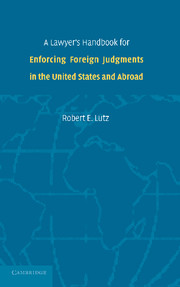Book contents
- Frontmatter
- Contents
- Preface
- Acknowledgments and Dedication
- Introduction
- PART ONE ENFORCING FOREIGN COUNTRY JUDGMENTS IN THE UNITED STATES
- PART TWO ENFORCEMENT OF JUDGMENTS ABROAD
- I Overview
- II How to Identify and Select Foreign Counsel
- III Documentation for Enforcement
- IV Understanding Foreign Enforcement Frameworks
- V Conclusion
- Bibliography
- Instruments, Laws, and Other Materials
- PART THREE THE FUTURE OF ENFORCING FOREIGN JUDGMENTS
- Bibliography
- Index
- Frontmatter
- Contents
- Preface
- Acknowledgments and Dedication
- Introduction
- PART ONE ENFORCING FOREIGN COUNTRY JUDGMENTS IN THE UNITED STATES
- PART TWO ENFORCEMENT OF JUDGMENTS ABROAD
- I Overview
- II How to Identify and Select Foreign Counsel
- III Documentation for Enforcement
- IV Understanding Foreign Enforcement Frameworks
- V Conclusion
- Bibliography
- Instruments, Laws, and Other Materials
- PART THREE THE FUTURE OF ENFORCING FOREIGN JUDGMENTS
- Bibliography
- Index
Summary
Part Two of this handbook is intended to outline for the U.S. practitioner how to obtain recognition and enforcement of a U.S. court-rendered judgment overseas. Once the practitioner has determined that the client requires foreign representation, the U.S. practitioner should become familiar with the recognition and enforcement regime to which the country in which recognition and enforcement are sought adheres: common law, exequatur, Bustamante Code, Brussels Regulation, or statutory scheme. If the country in which judgment is sought is Islamic, the U.S. practitioner should focus instead on obtaining an award under an international arbitration convention.
The practitioner has two goals in obtaining recognition and enforcement of a U.S. court-rendered judgment: the ethical goal to avoid the unlicensed practice of law (UPL) in an overseas jurisdiction (or in a domestic jurisdiction that does not permit the hiring of foreign legal consultants [FLCs]); and the professional goal of identifying, selecting, and informing foreign counsel of the underlying domestic action and validity of the U.S. judgment on the client's behalf.
As a practitioner, you have many resources available to you to help you meet these goals. This handbook provides a reference outline for beginning the process. However, before advising your client about foreign enforcement of a U.S. court-rendered judgment, you should review the resources particularly applicable to the country in which you will seek enforcement and recognition.
- Type
- Chapter
- Information
- Publisher: Cambridge University PressPrint publication year: 2006



